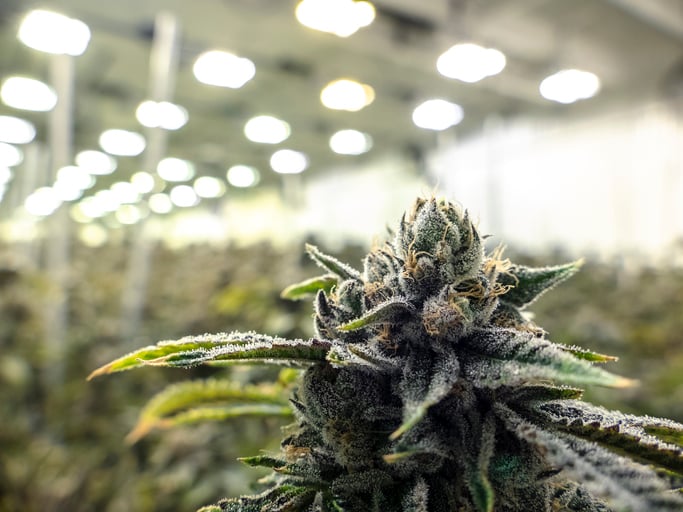This is likely to go down as the greatest year on record for the marijuana industry. Since the green flag waved on 2018, Canada legalized recreational marijuana, two additional states approved medical cannabis in the U.S. (with Michigan becoming the 10th to OK recreational pot), the U.S. Food and Drug Administration gave the thumbs-up to a cannabis-derived drug, and multiple pot stocks have uplisted to reputable U.S. exchanges.
Perhaps no marijuana stock to have moved from the over-the-counter exchange to a major U.S. exchange is better known than Canopy Growth Corp. (CGC +0.89%). Canopy is currently the largest marijuana stock by market cap and, as such, is viewed as a trendsetter for the industry.

Image source: Getty Images.
Everything you need to know about Canopy Growth's quarterly results
Canopy also just happened to report its much-anticipated second-quarter operating results this past Wednesday, November 14. While most folks were focused purely on the company's top- and bottom-line results, there's a much bigger story to tell. Here are the 15 things you should know about Canopy Growth's Q2 report.
1. Industry-leading harvesting in the early going
One of the first things that really stands out about Canopy Growth's quarter is that it harvested 15,127 kilograms, which was well over triple the 4,167 kilograms harvested in the year-ago period. Even though it sold far less than it harvested -- just 2,197 kilograms in Q2 2019, up from 2,020 kilograms in the year-ago quarter -- the sheer fact that its yield topped 15,000 kilograms during the quarter demonstrates just how far ahead of its peers this company is. Most of its peers are harvesting 5,000 kilograms or less each quarter.
2. 4.3 million square feet of licensed capacity
A key to its harvesting success is that it has 4.3 million square feet of growing space now licensed by Health Canada. Ultimately, Canopy Growth aims to have 5.6 million square feet of licensed growing capacity that, in my best estimate, would generate in the neighborhood of 500,000 kilograms per year. That'll probably make the company the second largest grower by annual output, behind Aurora Cannabis.

Image source: Getty Images.
3. Cannabis oils as a significant portion of sales
For its fiscal second quarter, sales increased to 23.3 million Canadian dollars, up from CA$17.6 million in the year-ago quarter -- a 33% improvement. Impressively, cannabis oils, which includes the company's line of softgel products, accounted for 34% of total sales, up from 18% of sales in Q2 2018. This is important, since oils are expected to remain a higher-margin product relative to dried cannabis flower over the long run.
4. Average selling price per gram on the rise
Canopy delivered great news when it announced that the average selling price per gram of product in the second quarter rose 24% to CA$9.87 from CA$7.99 in Q2 2018. The bulk of this increase derives from including more high-margin softgel capsules in its total sales. Expect Canopy to push these value-added products, which will also include pre-rolled joints, in the months to come.
5. Minimal recreational sales
If you were expecting recreational weed to play a notable role in Canopy's Q2 results, you have another thing coming. With the quarter ending before the legalization date on Oct. 17, the company only recognized CA$0.7 million in recreational channel sales. Don't be too disappointed, though, as this seems to be par for the course for all pot stocks in the recently ended quarter.

Image source: Getty Images.
6. 70,000 kilograms of annual provincial supply commitments
Without question, no marijuana grower has locked up more in provincial and territorial supply deals in Canada than Canopy Growth. According to the company's press release, it has supply commitments for 70,000 kilograms per year, not including Ontario. Depending on Canopy's peak production, we're probably talking about close to 15% of annual peak yield already committed. That's a continued step in the right direction for the largest publicly traded pot stock in the planet.
7. 76% surge in inventory levels
Rather than diving headfirst into the recreational market, Canopy Growth has done its best to maintain healthy inventory levels. That way it can presumably keep serving consumers even if its peers run out of product. During Q2 2019, the company's inventory value skyrocketed 76% to CA$171 million. That includes 31,214 kilograms of dried cannabis, 21,499 liters of cannabis oils, and 1,497 kilograms of softgel capsules.
8. An expanding retail and international footprint
It's no secret that Canopy Growth is looking to increase its physical retail footprint, as well as push into overseas markets. During the quarter, it completed its acquisition of Hiku Brands, adding a handful of physical locations in Winnipeg. It also made substantial headway in Latin America with its acquisition of Spectrum Cannabis Colombia.

Image source: Getty Images.
9. The U.S. market on the radar
Although the U.S. federal government continues to hold firm on its classification of marijuana as a Schedule I (i.e., wholly illegal) substance, Canopy Growth is clearly interested in the U.S. market, especially if the federal government changes its tune. During the quarter, Canopy announced plans to acquire hemp company Ebbu in the United States. Ebbu allows Canopy to (legally) get its foot in the door and places it in prime position to take advantage of any change in federal law in the future.
10. Moving beyond cannabis
A big focus in the second quarter (and beyond) is that of moving beyond just dried cannabis. In addition to focusing on high-margin alternative products, Canopy purchased Canopy Health Innovations, which'll be conducting a phase 2b human clinical trial to treat insomnia patients with medical cannabis. Likewise, Canopy Animal Health is examining the uses of cannabidiol to treat anxiety in certain animals. These are all new potential sources of revenue beyond just dried flower.
11. Canopy's massive war chest
This probably goes without saying, but the company has an insane amount of cash for a pot stock. It ended the second quarter with CA$429 million in cash and cash equivalents but wound up closing on the CA$5 billion equity investment from Modelo and Corona beer maker Constellation Brands subsequent to the quarter end. Acquisitions are very likely with the company sporting so much green.

Image source: Getty Images.
12. Fair-value adjustments working both ways
Under International Financial Reporting Standards, some crazy things happen with agricultural companies. Recently, as cannabis growers expand their capacity, we've seen fair-value adjustments to biological assets providing an above-the-line boost to pot stocks, pushing some into the black. But this door swings both ways. In Q2 2019, Canopy Growth saw a CA$6.6 million gross profit turn into a nearly CA$34 million loss after taking fair-value adjustments to its cannabis plants and inventory.
13. Losing a lot of money on an operating basis
Canopy Growth is losing a whole lot of money on an operating basis at the moment. Sales and marketing expenses soared to CA$39 million from CA$7.6 million, general and administrative costs ballooned to CA$37.1 million from CA$8.4 million, and share-based expensing catapulted higher. In total, operating expenses in the latest quarter were CA$180.6 million, up from only CA$27.7 million in the year-ago quarter. Not surprisingly, Canopy reported a huge net loss of CA$330.3 million, or CA$1.52 per share, in Q2.
14. Dilution as a long-term concern
On top of turning in a stinker of a quarter from a fundamental perspective, dilution remains a concern. Even though it's now well capitalized following Constellation's equity investment, the company's outstanding share count has risen from 168.8 million in the year-ago period to 223.7 million shares as of Sept. 30. Acquisition-based share issuances and option exercises could mean continued share inflation in the future. And as the number of outstanding shares rises, it becomes tougher for a publicly traded company to deliver a meaningful per-share profit. This is something investors should keep in mind when weighing pot stocks like Canopy Growth for investment.

Image source: Getty Images.
15. "For sure there is a marijuana bubble"
Lastly, following the release of the company's operating results, CEO Bruce Linton admitted, "For sure there's a marijuana bubble," while being interviewed on Yahoo! Finance's Midday Movers show. To be clear, Linton also sees plenty of very good companies within the space, including his own, but his words speak volumes about perceived valuations.
Though this is a company that brings clear competitive advantages to the table, its market valuation leaves a lot to be desired.






